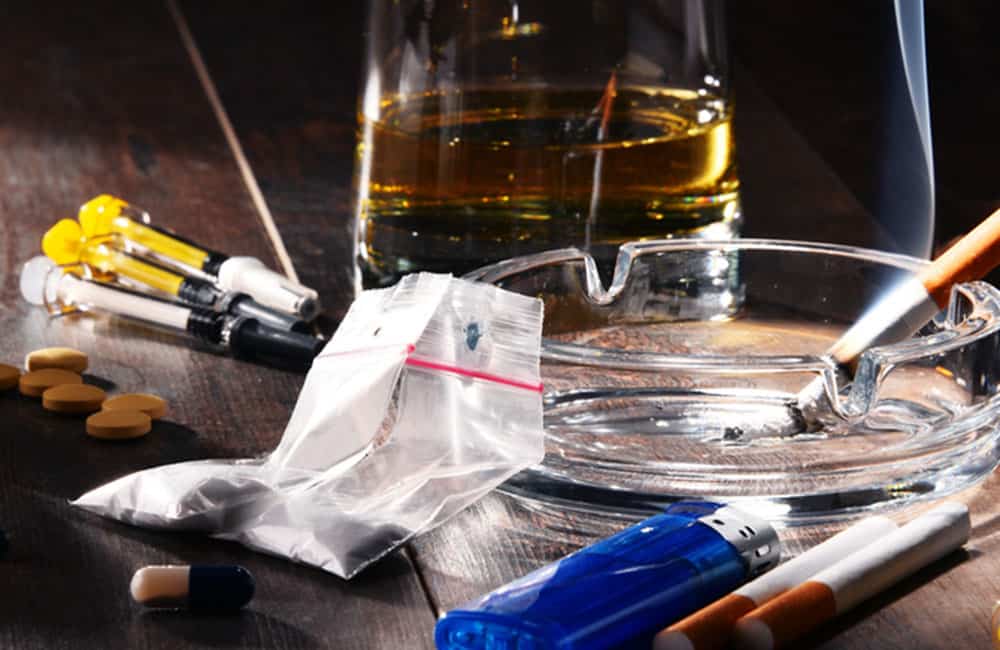Individuals who suffer from multiple drug abuse problems have what is known as a polydrug or polysubstance abuse problem. Those who struggle with polysubstance abuse often have difficulty breaking free from just one addiction, not to mention the other substance dependence challenges they have.
This is why it’s so important for people who have multiple drug abuse problems to get treatment from a rehab center that is able to focus on helping to end their struggle with every substance use challenge they are facing.
How Do People Develop Multiple Drug Abuse Problems?
Some people use one drug or substance in order to counteract the unpleasant effects of another. For instance, certain drugs (i.e. cocaine) can make people feel anxious, especially once the initial high wears off. In order to combat this anxiety, people may take medication that is meant to reduce this system.
In some cases, people unintentionally become dependent on drugs or alcohol. They may engage in polydrug use without realizing that they’re doing so. For example, some people may consume alcohol or take medication, not realizing that they have already taken medication that shouldn’t be combined with other substances.
But, as far as multiple drug abuse problems are concerned, many people become involved with this harmful substance use habit knowingly. Often, individuals who regularly use substances such as cocaine, heroin, methamphetamine, and so forth begin seeking a more intense “rush”. Using a combination of drugs can often provide that sensation. So, users may begin to abuse multiple drugs at the same time in order to experience this rush.
Intentional polydrug abuse doesn’t always involve illicit drug use. Sometimes, people abuse multiple prescription drugs. Many prescription drugs are both addictive and habit-forming. When taken in excess, some of these substances can create a euphoric high, causing users to become dependent on them.
Whether a person becomes dependent on prescription drugs, illicit drugs, or alcohol, this can result in substance abuse and addiction. When the body depends on a substance, it craves the substance severely and intensely. This causes users to continue using, regardless of the dangers or consequences.
Again, people often engage in multiple drug abuse in an attempt to heighten or intensify the effects of the drugs they’re using. Certain drugs elevate the effects of others. So, people may use two or more substances simultaneously or directly after one another in order to experience the amplified impact of alcohol or drugs.
Which Types of Addiction Often Co-Occur?
As a result of regularly using more than one substance at the same time, many people develop addictions to multiple substances. Some of the common substance combinations which people may abuse include the following:
Cocaine and Alcohol
Sometimes, individuals use cocaine and alcohol together. Alcohol is a depressant while cocaine is a stimulant drug. Many people who use this combination do so because they believe that alcohol will make the effects of cocaine last longer. Cocaine use creates a sense of euphoria, a “high”.
While some people combine alcohol and cocaine in an attempt to strengthen the pleasant effects of these substances, others do so because they believe this combination will lessen or weaken the unpleasant effects of these substances. These undesirable effects include anxiety and twitching, which can be uncomfortable for users.
Also, using cocaine along with alcohol can help to weaken the effect of alcohol. This makes it easier for users to consume more alcohol.
Either way, the impact of using this substance combination remains the same. When alcohol and cocaine combine, they cause the liver to develop cocaethylene, a chemical that can be very dangerous. Its effects can be felt almost immediately; it causes the desired effects of alcohol and cocaine to become stronger and more intense.
But, cocaine causes a person’s heart rate to increase and the impact of cocaine use on the body is usually intensified by the presence of alcohol. This makes the combination of alcohol and cocaine both dangerous and, in some cases, deadly.
Heroin and Cocaine
This is one of the most common drug combinations and is, unfortunately, quite popular among those who engage in polydrug use. In fact, the heroin-and-cocaine combination has a well-known nickname: speedball.
The effects of heroin often last longer than the effects of cocaine. Still, this combination is one that many people who suffer from addiction find desirable.
Again, cocaine is a stimulant drug. Heroin, like alcohol, is a depressant. Many times, people use these drugs in combination because they want to weaken the negative and unpleasant sensations that come with using these drugs.
Heroin (and other opiates) tend to make people experience drowsiness, sleepiness, and itchiness. Cocaine may help to block users from feeling those symptoms. But, this often causes users to feel as though they can handle more heroin. This, in turn, could lead to a heroin overdose.
Ecstasy and Cocaine
Sometimes, people mix cocaine and ecstasy. “Ecstasy” is actually the street name for a drug called 3,4-Methylenedioxymethamphetamine, which is a psychoactive drug.
Both cocaine and ecstasy are stimulant drugs and, when combined, they can produce a strong euphoric effect. The “rush” that comes with cocaine use and the “rush” produced by ecstasy use can become even more powerful once both substances enter the bloodstream.
Alcohol and Benzodiazepines
Benzodiazepines, commonly known as benzos, are pharmaceutical drugs. They are usually used to treat certain mental health disorders as well as other illnesses. Benzos can help to treat epilepsy, anxiety disorders, and panic attacks.
Alcohol and benzos are depressants, as they cause the central nervous system (CNS) to function slower. Both of these substances influence the way the brain performs. Still, many people who abuse these substances feel like using benzos with alcohol is less harmful than using illicit drugs, such as cocaine or heroin.
Of course, this isn’t true. But, combining alcohol and benzodiazepines, such as Xanax, often provides the rush or high people desire. Using these substances together enhances their effects. Since both benzodiazepines and alcohol are depressants, they have a sedative impact on users. This effect is definitely intensified when people use these two substances at the same time.
Ecstasy and Alcohol
Both alcohol and ecstasy are commonly found at parties. Since they’re so easily accessible, it’s fairly common for people to combine the two. Alcohol is a depressant, affecting the central nervous center (CNS) and slowing down the functions of the brain. Ecstasy, unlike alcohol, is a stimulant. It’s also considered a hallucinogenic.
People use ecstasy in a pill form or snort its powder form. Ecstasy produces a high, a sense of euphoria that often feels pleasurable. But, using this drug can also cause people to experience unpleasant symptoms, including anxiety, paranoia, and confusion.
Individuals may use alcohol along with ecstasy in order to lessen these negative symptoms and enhance the pleasurable effects of euphoria.
Alcohol and Sleeping Pills
People who may have occasional trouble sleeping or suffer from insomnia may use sleeping medication in order to help them fall asleep at night. But, for some individuals, taking these medications alone doesn’t seem to do the trick. In order to enhance the effects of sleeping pills, people may drink alcohol.
The Dangers of Abusing Multiple Substances
Some of the main complications and dangers that can occur when combining drugs with alcohol or other drugs can include:
- Nausea
- Vomiting
- Seizures
- Overdose
- Self-harm
- Liver damage
- Suicidal thoughts
- Increased irritability
- Breathing problems
- Reduced metabolism
- Problems with balance
- Changes in heart rate
- Changes in blood pressure
- Overheating and heat stroke
- Loss of control of substance intake
- Increased tolerance for harmful drugs
- Chronic substance abuse and addiction
- Loss of ability to reason or think clearly
Also, substances that are used in combination may cause adverse effects. Not only is this extremely uncomfortable, but it’s also dangerous and can cause people to become sick, overdose, or lose their lives.
Often, people who abuse substances view the action of mixing drugs seems harmless at the moment. However, this is far from harmless. Even if an individual mixes legal medications with other substances, the dangers presented by this substance abuse are life-threatening.
Combining alcohol with drugs, whether illicit or pharmaceutical, can cause life-long physical health problems and even lead to fatality.
How Polydrug Abuse Affects Daily Life
Those who suffer from multiple drug abuse problems often struggle to maintain normalcy and routine in their everyday lives. Using powerful substances repeatedly can cause individuals to become physically, emotionally, and mentally ill.
Many times, people who are living with one or more addiction problems withdraw from others, becoming more and more isolated as they fall deeper into substance abuse. Some people become distant from loved ones in an effort to hide their substance use habits.
People also tend to lose interest in activities they once enjoyed. Instead, they seek to feed their addictions, looking for the next opportunity to purchase and use drugs or alcohol. This is due to the effect substance abuse has on a person’s body. Even if they try to avoid using or drinking, the body continues to crave substance use. This severe craving can make it nearly impossible for people to ignore on their own.
Also, the fact that people who suffer from multiple substance use problems have difficulty controlling their substance use is a problem in and of itself. This lack of control can cause people to become so immersed in the world of addiction that they lose the ability to keep up with responsibilities in their daily lives. Often, people who struggle with substance abuse lose their jobs, struggle in their studies, have trouble taking care of their families, and even lose interest in or the ability to care for themselves.
One of the outward signs of substance abuse is a lack of self-care. Many individuals who struggle with addiction have difficulty practicing good hygiene and often appear disheveled or unkempt.
Treating Polysubstance Abuse at Northbound Treatment Services
Here are some elements of our Multiple Drug Treatment Program:
- Initial Psychological Assessment
- Trigger Chart Group
- Step Workbook Assignments
- Daily Journaling
- Cognitive Behavioral Based Groups
- Motivational Enhancement Therapy Groups
- One-on-One Therapy
- One-on-One Case Management
- Self-Esteem Group
- Guided Meditation
- Advanced Life Skills Groups
- Career and Educational Assessment and Planning
- Educational Lectures on Addiction
- Engaging Group Activities
- Creative Arts Groups
- Narrative Therapy
- Daily Exercise at 24 Hour Fitness
- Personal Exercise Training and Planning
- Medication Assessment
- Psychiatric Evaluations
- Psychological Testing
- A System of Rewards and Consequences
- Sports Team Involvement
Many people at Northbound enter into treatment addicted to many different drugs. It is rare that a person will enter into treatment addicted to only one drug. Addiction can be treated from a variety of philosophical and psychological perspectives, but at Northbound we have chosen to use the method of treatment that best fits the individual and their needs.
Let Us Help You Break Free From Addiction
Various types of therapy can help people to end substance abuse in their lives. Here are just a few of the ways in which our addiction therapy approaches:
Cognitive Behavioral Therapy
This approach helps people to recognize, understand, and address harmful thought patterns and cognitive activities. By identifying these patterns and processes, individuals can gain a deeper understanding of why they struggle with addiction and how their thoughts cause this problem to continue. Once they are aware of these things, individuals in therapy can also learn how to combat and replace these negative and harmful patterns with positive ones.
Fitness Therapy
By learning how to care for one’s physical self, a person can become more emotionally and mentally healthy. Fitness therapy, exercise classes, and physical activities can help people to become more fit, encouraging self-esteem and self-care habits.
Dialectical Behavioral Therapy
Also known as DBT, dialectical behavioral therapy helps individuals in treatment to develop healthy behaviors and expectations, which are helpful both throughout the treatment process and afterward. Through DBT, individuals can learn to focus on the things they can change while accepting the things they can’t.
Northbound is experienced at treating all addictions, from gambling addiction to heroin addiction. We have developed the most comprehensive treatment program available to people struggling with addiction. We have researched and studied the best addiction treatment programs in the world to develop our program.
If you or a loved one is struggling with an addiction we can help. Contact us today by calling (866) 511-2458 and we can discuss our treatment options with you.
References:
https://www.narconon.org/drug-abuse/polydrug/reports.html
Author
-

President, CEO & Founder at Northbound Treatment Network
Paul Alexander is the CEO, President & Founder of Northbound Treatment Network in Newport Beach, California. He believes wholeheartedly in transformational leadership, organizational health and effective, fully integrated substance use disorder and mental health treatment. With over 27 years of experience in behavioral healthcare, Paul has extensive knowledge of “in vivo” treatment modalities, clinical development, operations, strategy, marketing and financial planning. He has been widely recognized for his development of collegiate-based residential treatment programs for students in recovery and authored a research study at The University of California confirming this modality’s effectiveness.
Paul’s comprehensive professional experience, willingness to innovate, and emphasis on organizational health are vital factors in Northbound’s continued success. Paul received his Certified Addiction Treatment Specialist training at Saddleback College in Mission Viejo, CA, and was awarded Outstanding Alumni Service Award in 2002. Paul holds a Bachelor of Arts degree in Criminology, Law and Society, Summa Cum Laude, from University of California, Irvine, and a Juris Doctorate degree from Loyola Law School of Los Angeles. Paul currently serves on The National Association of Addiction Treatment Providers (NAATP) board. In addition, he serves on The Family Recovery Foundation board and The CarePossible board in Orange County; both organizations are committed to raising funds for family recovery and treatment for former military personnel. Paul is in recovery himself and lives in Orange County with his wife Silvana and his two young sons, Noah and Dean.










